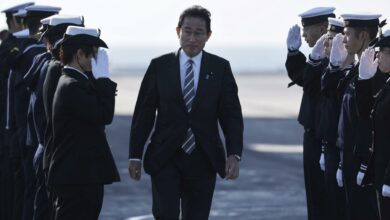Nicaragua authorizes entry of Russian troops, navy ships, warplanes

Managua, Jun 14 (EFE).- Nicaragua’s National Assembly, where the Sandinistas have a decisive majority, on Tuesday authorized the entry of Russian troops, navy ships and aircraft – at the urgent request of President Daniel Ortega – to participate in anti-crime operations off the country’s Caribbean and Pacific coasts.
The entry of troops from Russia, which invaded neighboring Ukraine on Feb. 24 and has been mired in warfare there ever since, was given the green light with the vote of 78 Sandinista lawmakers and their allies, out of the 91 seats in Parliament.
The legislators also approved the entry of military personnel, ships and aircraft from Cuba, the United States, Mexico, Venezuela and other Central American countries for six months starting in July.
During debate on the measure, lawmakers supporting the Ortega government denounced what they claimed was a campaign by other countries and international media outlets regarding the entry of Russian troops into Nicaragua.
The head of the Defense and Security Committee, Sandinista Filiberto Rodriguez, told the plenary session that “it’s already a tradition to approve and ratify” the entry and departure of military forces from different countries with whom Managua maintains “diplomatic and military relations.”
In that regard, he lambasted US Assistant Secretary of State for Western Hemisphere Affairs Brian Nichols for criticizing the entry of Russian military personnel and equipment into Nicaragua.
“He doesn’t remember, doesn’t know or is misinformed that this is a tradition and that the entry of US troops is also being authorized,” said Rodriguez, rejecting the idea that Nicaragua might pose a threat to regional security.
Meanwhile, Sandinista lawmaker Walmaro Gutierrez accused the international press of waging a campaign against the entry of Russian military forces “with the aim of diverting and distracting national and international public opinion.”
He mentioned CNN, the BBC and the Spanish daily El Pais “and many other (media outlets) who have participated in this dirty campaign,” whereby, he said, “in a deliberate manner they have misrepresented and lied with the sole objective of creating discord and anxiety.”
Regarding the entry of military forces from other countries, Gutierrez said that since 2007 Nicaragua had approved 40 decrees of this same kind and that “recently” that had been done “every six months.”
“The … troops that (Russia) has brought (to Nicaragua) are taxis, buses and training for the National Police,” declared Sandinista lawmaker Moises Absalon Pastora.
Ortega, an ally of Russian President Vladimir Putin, authorized the entry of Russian troops during the second half of this year to participate in operations “against criminals” in Nicaragua’s portion of the Caribbean and the Pacific Ocean, according to the decree.
In addition, 80 Russian troops will enter the country to participate with the Nicaraguan army’s elite corps “in exchanging experiences and conducting training in humanitarian aid operations.”
Moreover, 50 additional Russian troops, again on a rotating basis, will enter the country to participate with members of the Nicaraguan navy, air force and signals corps “in exchanging experiences and operational communications with vessels and aircraft of the Nicaraguan army in tasks to confront and fight against drug trafficking and transnational organized crime.”
In all, the Sandinista leader authorized the entry of an undetermined number of Russian troops, naval vessels and aircraft between July 1 and Dec. 31, 2022, all of whom are to participate, among other things, in “exchanging experiences and training in security tasks.”
In the decree approved on Tuesday, Ortega also authorized the entry of Venezuelan military personnel, vessels and aircraft to carry out similar tasks to those of Russia, again for six months.
He also received authorization for the entry of Cuban, Mexican and Central American military personnel and equipment to participate with Nicaraguan forces in “exchanges and work of a humanitarian nature.”
Regarding the US Armed Forces, Ortega received authorization for an unspecified number of military personnel to enter the country, with their entry “previously planned and coordinated with the Nicaraguan army.”
On Monday, Costa Rican President Rodrigo Chaves expressed his concern about the pending arrival of Russian troops and military hardware to Nicaragua.
Russia is a long-standing ally of Nicaragua, and during the first Sandinista regime from 1979-1990 Moscow provided Soviet armaments to the country’s armed forces.





